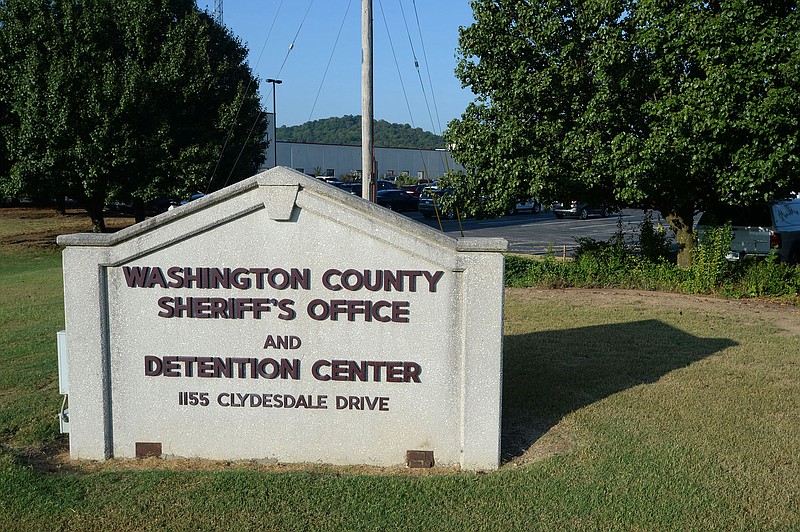FAYETTEVILLE -- While Washington County officials study ways to control the county jail's population, Sheriff Tim Helder says the number of detainees is approaching and will almost certainly pass the pre-covid levels of 2019 and early 2020.
The Washington County jail's population hit a record high of 802 detainees on Feb. 6, 2020, according to sheriff's office information.
The sheriff's office worked with the prosecuting attorney, public defender and circuit court judges to reduce the number of people being held in the jail when the covid-19 pandemic began in March 2020.
That effort included increasing the number of felony citations issued to offenders in lieu of taking them to the jail, releasing some detainees on their own recognizance, implementing a pilot program of releasing some detainees who agreed to wear ankle monitors as a condition of their release, and working to lower bail amounts for people who had not been able to pay higher amounts.
The jail has a design capacity of 710 beds, according to the sheriff's office. With legal requirements for separating different classifications of detainees, the operating capacity is about 80% of the design total, or about 570 detainees.
The jail population hit a low of 373 detainees May 1, 2020. The jail had 712 detainees as of Tuesday.
"Minus anything earth-shattering, we are going to be beyond our 2019 numbers and be up in the 800s as far as our detainee population," Helder said. "We're going to hit that in the early spring of next year if nothing changes."
Helder presented a plan for a $38 million, 600-bed jail expansion to the Washington County Quorum Court in 2018. The expansion would have been paid for by a temporary sales tax.
The justices of the peace said they wanted to explore alternatives to a jail expansion, and a report authorized by the Quorum Court recommended forming a Criminal Justice Coordinating Committee to consider options short of expanding the jail. That committee is still being organized, with the county having received about 15 applications for a director or coordinator.
The Criminal Justice Coordinating Committee includes representatives from law enforcement, judges, prosecutors, public defenders, mental health professionals and some community representatives. The group has made some steps on its own, including a planned trip to Jonesboro to observe a mental health court as one way of diverting some people from incarceration.
Prosecuting Attorney Matt Durrett said the group needs someone who can do the detailed work of gathering information and keeping the committee focused. He said committee members already have full-time jobs and can't reasonably take on that kind of workload.
"There's a lot of data that has to be gathered and looked into," Durrett said. "I know I don't have the time to do it and none of the other committee members do."
Durrett said the coordinator also will monitor any programs the Quorum Court agrees to adopt, like a mental health court or having a public defender assigned full time at the jail to speed up the processing of cases.
"The Quorum Court has said they want the metrics, they want to see some basis of measuring progress so a lot of the work is going to be gathering data," Durrett said. "For instance, if we have programs that are meant to reduce the time a pretrial detainee spends in jail, we have to have data on the average time spent in jail prior to disposition. Even that has to be broken down because you don't get a good comparison using just raw numbers."
Benton County's County Judge Barry Moehring said his county's Criminal Justice Coordinating Committee was "dormant" during the pandemic but has resumed its work in the past few months. He said the county is looking at alternatives to incarceration but is also working on a jail expansion to rectify deficiencies that became apparent during the pandemic.
"We're looking at a consulting contract to do a conceptual design to accommodate adding some space to our intake and some isolation areas," Moehring said.
"In Benton County at the height of the pandemic, the hottest of hot spots was the Benton County jail. It would be irresponsible of us not to recognize that and to plan for the possibility of it in the future," he said.
Helder said he supports the Criminal Justice Coordinating Committee and is open to alternatives to incarceration, but the county's experience, even through a health emergency, convinced him that more space is needed at the jail.
The Quorum Court approved some design work on a possible expansion to improve the intake and processing areas, and provide more flexible space for quarantine and isolation of detainees in the event of future health emergencies, and some added space in more normal conditions. That work, however, would take 14 to 24 months if it's approved, he said.
"We're releasing as many people as the law will allow," Helder said.

